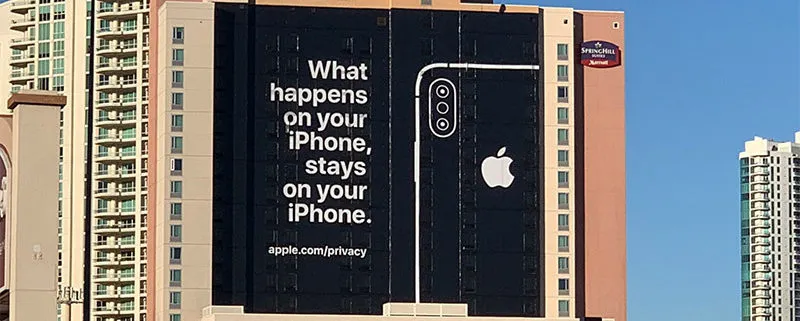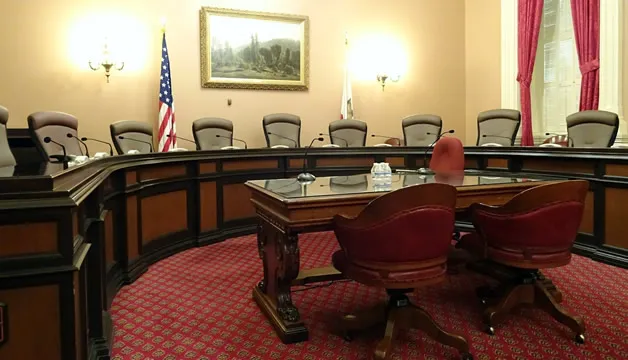
CES will be in full swing this week, with hardware announcements from Apple, AMD, HP and every tech company imaginable. It remains to be seen if any blockchain innovations make it into CES, but I'm betting that even if they are, they will be overshadowed by AI and virtual tech releases and of course the latest, fastest, slickest chips, gaming machines, and displays. But one thing caught my eye that happened outside of the CES Halls of Geek. The Apple ad projected on the side of hotel overlooking the Convention Center.
What Happens on Your iPhone Stays on Your iPhone
While this message that stretches over 13 floors of the building is an obvious swipe at companies like Facebook, (the privacy policy url included in the message is a dead giveaway on that) I couldn't help but think of the blockchain when I saw pictures of this ad. I can't think of a better tagline for blockchains as they currently exist. While privacy is not the key issue for the decentralized blockchain, whatever goes onto it, in any form, stays on it securely.
Since pretty much everything is open for everyone to see, monetizing customer data could easily occur, but would also be instantly obvious to anyone looking at the hash. No more "backroom" deals and obfuscating statements from management.
But while blockchain tech probably won't make any headlines, or even a below the fold mention in the tech journals covering CES this week, there is one question that I keep coming back to as I think about the early days of the internet and the differences we're seeing in this current tech revolution.
Waaaay back in the late 90's, the U.S. faced an important crossroad. To regulate the budding new technology of the internet, or to leave it spread it's wings and grow unfettered by government interference? Bill Clinton made a statement in 1997 that set me dancing in the street for which I have been eternally grateful. President Clinton said:
The internet should be a place where government makes every effort … not to stand in the way, to do no harm.
The report that was issued following that statement Global Framework for Electronic Commerce ushered in an era of personal and national prosperity. Those of us toiling in the trenches of the burgeoning internet, heaved a sigh of relief as the uncertainty of government involvement was spelled out. No state or Federal agency would interfere with our development and growth. Transactions would not be onerously taxed. WE could grow - unfettered from multiple alphabet agencies populated by minions who had no clear understanding of what the internet was or what we could grow it into.

Today, the political and regulatory climate seems to be different. Cryptocurrency tokens are tied into the blockchain and while the same lack of technical understanding that was present in the early days of the net, surrounds crypto and the blockchain, multiple governments and agencies around the world seem to be taking a much different stance.
What is a crypto token? Is it a security? Are all tokens the same and should they all be regulated in the same fashion? The SEC seems to think so. But they also don't seem to have any clarity on what sort of security they might be, so they also seem to be uncertain what type of regulation is called for.
William Mougayar writes:
Instead of leading with hope, optimism and open-mindedness, the SEC has been instilling fear into the markets by issuing a series of mixed actions, publishing unclear statements and sending cryptic messages via occasional speeches. They have divided and conquered the blockchain industry by stringing its participants along, without sharing any form of original thinking.
While the rest of the world has set about defining models to govern ICOs and setting up friendly jurisdictions for cryptocurrency token exchanges, the U.S. is watching it's tech innovation and blockchain entrepreneurs head out the door. While the U.S. has been known for leading the world in tech startups, the current regulatory climate is a far cry from the Clinton era while countries like Singapore, Switzerland, and Malta are welcoming blockchain startups with open arms.
Blockchain is here to stay. It's here to stay, not just because some geeks somewhere are creating nifty new things that will disrupt and improve many industries and daily life events. It's here to stay because people WANT what it offers. From the possibility of global financial instruments available to "everyman", to the very basic tenet of "what goes on the blockchain STAYS on the blockchain", the 4th Industrial Revolution, led by blockchain technology is here because it is needed and wanted. Another old slogan from past history sums it up - Power to the People.
And even the SEC can't stop or deny that global desire. All they can do with their waffling and lack of understanding is prevent the U.S. (and me) from cashing in on the growth of this technological leap forward.